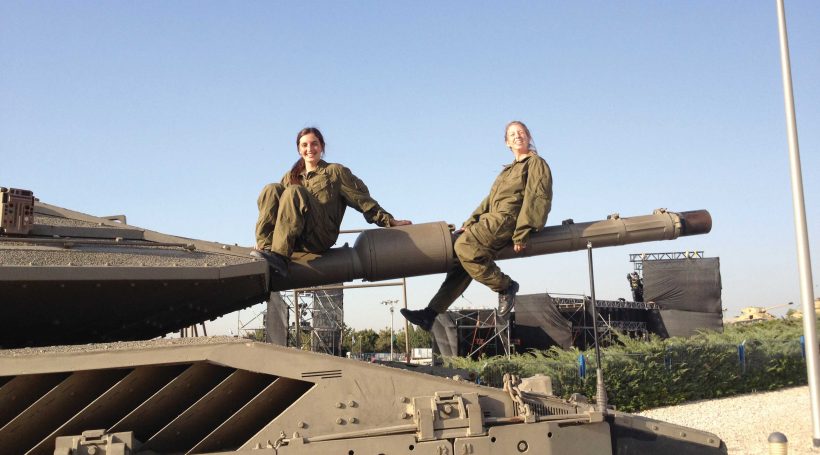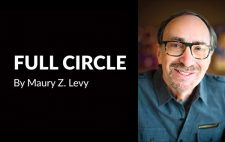On most days, 20-year-old Yael Shamir’s thoughts are consumed by the tank soldiers she has trained. Stationed at the border between Israel and the Gaza Strip, Shamir is 6,000 miles from her family home in Voorhees. But that is what she chose. After graduating Eastern High School, Shamir deferred college to enter the Israeli army. She is now considered a lone soldier – the name given to soldiers who come from other countries.
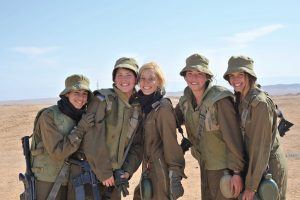
Yael Shamir is pictured with fellow soldiers – and friends – near the Gaza Strip
“I instruct combat soldiers on the different shooting techniques of the Merkava Mk 4 tank,” she says. “I trained the soldiers on simulators before they went into war. We do our best to teach them the right things, so they stay safe.
“Knowing people fighting in Gaza was the scariest thing I’ve ever experienced. You can’t think about anything else. You get those notifications on your phone suddenly that there’s a killed soldier, and it could be one of your friends. I personally knew a few people who were killed in the operation. In one week I went to three funerals, and that was the first time in my life I went to a funeral. The scary part is knowing the people you love are in the danger zone.”
Born in Israel, Shamir’s family – her parents, two older brothers and one younger brother – came to the United States in 2006 when she was 12, settling in Voorhees. “It was a relocation for my dad’s job,” she recalls. “We had the opportunity to come to America, and it was very exciting. I’m glad we did.”
As she prepared to graduate high school, Shamir faced a big decision. “In Israel it’s mandatory to go into the army at the age of 18, so while I lived in Israel that was obvious,” she says. “But once I moved to America, it wasn’t so obvious anymore. When you live here you know you’re going to college – that’s the accepted thing to do. But when I got to the age of 18, I had to make a decision. I had a boyfriend here, and I didn’t want to leave.”
Shamir applied to colleges in the U.S., and also attended Garin Tzabar seminars, which are for young people who live abroad but want to join the Israeli military. Though she was accepted to Pace University for filmmaking, she ultimately chose to return to Israel and join the army.
“At a certain point I decided I needed to stop lying to myself,” she says. “Even though I lived here and loved it here, I felt more at home in Israel. I heard more about the army and thought if I didn’t go, I wouldn’t forgive myself. I would regret it my whole life. Israel is under attack all the time, and I wanted to do whatever I could to give something back.
“And that’s also why I chose my position. It’s a position I wanted from the beginning – not because I have a history with tanks – but I thought it was challenging. It is an interesting tool, and I wanted to learn about it. It’s an amazing machine. Outside it looks really cool, but inside it’s crazy – some of the most advanced technology there is in Israel.”
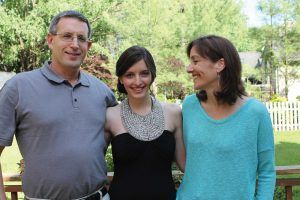
Shamir with her parents before Eastern High School’s prom in 2012
Shamir says her parents, both Israeli, did not try to sway her and were proud of her decision. Her oldest brother chose not to go into the army while her older brother did.
“My parents told me they were happy if I went to college or if I went into the army; it was my decision,” she recalls. “But they were happy when I decided to go into the army, and they supported me 100 percent. They were both in the army, and they know you learn things there you can’t learn in any college.”
After completing an eight-month training course, Shamir taught soldiers from basic through officer training. She made an initial two-year commitment and recently signed on for another six months in a position she can’t discuss. Admittedly not a techy or even into cars, Shamir has an appreciation for the tank’s power.
“I’ve gotten to drive it and shoot it, and I know in the recent operation how many lives it saved,” says Shamir. “It’s not that I know what it could do, I know what it did. All my friends who came out of Gaza said if the tanks weren’t there, they don’t think they’d be alive.”
Her dedication to her job caught notice from her superiors, leading to a commendation by former Israeli President Shimon Peres. She was one of 120 soldiers who were recognized. “It’s a huge honor. My officer told me the way I do my job and communicate with the soldiers is something they appreciate, and also because I’m a lone soldier,” she says.
The lone part isn’t easy. Being so far away from her family and relying on herself for all her basic needs can be challenging. Shamir’s workdays are grueling.
“We start work at 7 with not a second to breathe,” she says. “You run from place to place doing different practices for the soldiers and training new instructors. It’s hectic. There’s a break for lunch and a break for dinner, either a half hour or an hour. That’s your break for the day. My day ends usually around midnight and we go to bed around 2 am, because we are still doing preparations for the next morning. It’s like that every night. It’s hard because we barely get any sleep, but I enjoy that I have a lot to do.”
On weekends she goes back to her kibbutz in the north region of Israel. “A kibbutz is communal living,” she says. “There, I’m with my second family, which is 20 lone soldiers. My kibbutz is very far from everything, and we don’t have cars so we go to the pool there. There are a lot of springs in the area where we live, and we go on hikes during the day and relax. It’s beautiful. We’ll go to some pubs in the area at night.”
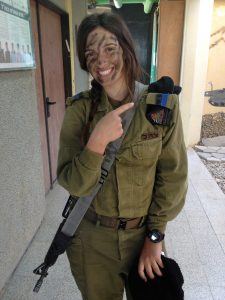
Yael Shamir
Shamir says she loves living in Israel even though there is the threat of danger. “The rockets can hit anywhere, and it’s a little scary if you’re on the train and there’s nowhere to go that can protect you,” she says. “People don’t stop their lives though. They still go to restaurants and on trips; you just have to be close to a shelter.
“I was in a restaurant with a few of my friends. We went to have a nice dinner – as nice as it could be. Suddenly one of the waiters yelled for everyone to be quiet, that there was an alarm and to leave the restaurant and go to a certain shelter. It was a place with a lot of restaurants so you saw a thousand people coming from all the restaurants and going into this one tiny place. No one was panicking, because it happens every day. In Tel Aviv you have a whole minute to get to a shelter but in places near Gaza you have 15 seconds, which is nothing.”
While Shamir is content with her decision, she does miss her family and her mom’s cooking. On her recent trip home – lone soldiers get to go home for 30 days – she visited some of her favorite haunts. “Panera Bread is my favorite place and Dunkin’ Donuts and, of course, going shopping. In Israel everything is very expensive, and we don’t get to go shopping. I miss having everything close by and being so easy. In Voorhees if I need to get cereal, I just go to the store that’s five minutes from my house. I don’t have to wait until the weekend and take buses to get more cereal. It’s the littlest things that are so easy here that are so hard in Israel.
“I am still the person I was, but it taught me a lot of things,” she says. “I learned I have leadership skills I didn’t know I had. In high school I was pretty quiet. I had a few friends, and that’s how I liked it. Even though I’m quiet and not very charismatic, I learned I could be. As a tank instructor they train you to be those things. I wasn’t friendly before, but now I think I have people skills and can easily connect with many types of people.”
When her service ends, she plans to work on an agricultural kibbutz for six months to a year to earn money and then travel for as long as the money holds out. “I’m going to travel either in South Asia, South America or Africa,” she says. “We take time off after two years of army. Emotionally I wouldn’t be able to go right to college.”
Shamir does plan to attend college after her travels. She isn’t sure what she’ll major in, though she’s pretty sure it won’t be filmmaking this time. “I liked that in high school, but I don’t know if at the age of 18 we really know what we want to do,” she says. “I think I want to do something that helps lone soldiers or maybe speaking for Israel around the world, because it’s something I am really passionate about. It’s something I believe in.”

